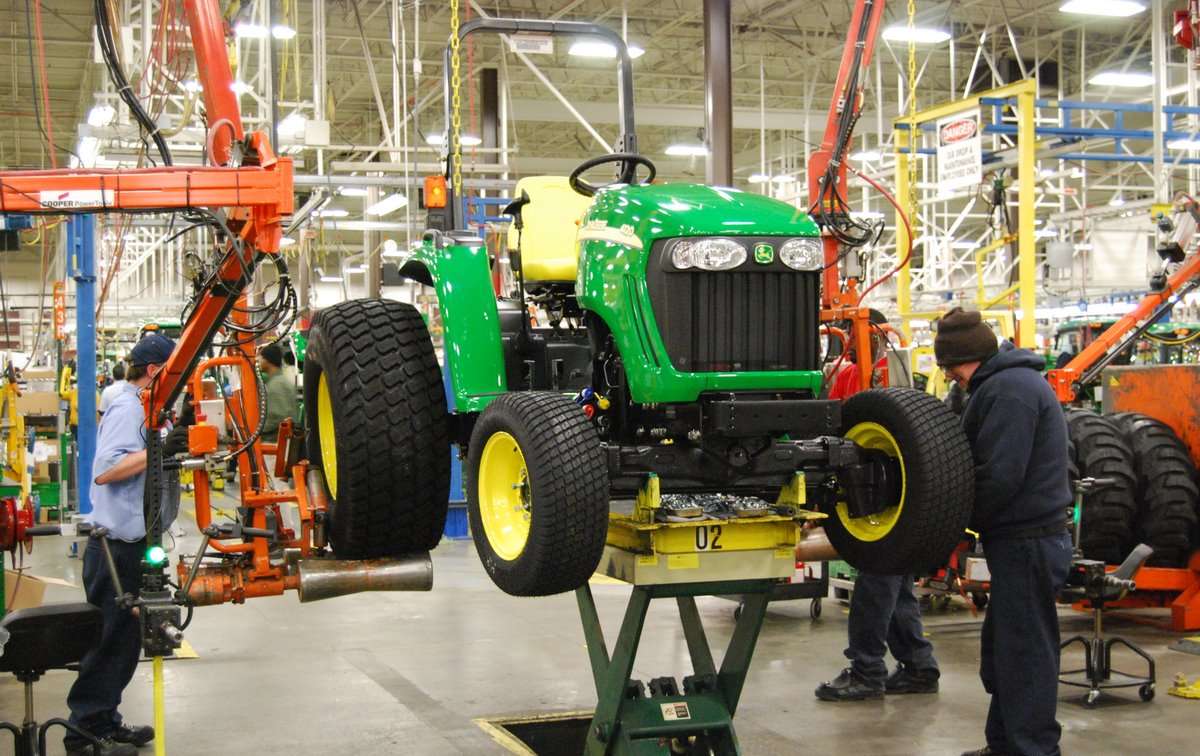
John Deere factory tour and testing in Augusta, Georgia, as seen on January 27, 2021.
CHARLES & HUDSON / FLICKR
PUBLISHED September 9, 2021
Ten thousand production and warehouse workers for the farm equipment manufacturer John Deere will take a strike authorization vote September 12 across nine Auto Workers (UAW) locals in Iowa, Illinois, and Kansas.
Strike authorizations at bargaining time are not unusual for John Deere workers, and they haven’t struck in 35 years, but there are reasons to watch this round of negotiations closely.
The last contract in 2015 passed very narrowly, by fewer than 200 votes out of 10,000 eligible voters, who traded rising health care costs for a small pay bump.
The largest Deere local, Waterloo Local 838, rejected that contract 2 to 1; Ottumwa Local 74 also turned it down. Hundreds of laid-off workers were allowed to vote on it, though — and with a hefty $3,500 ratification bonus, many of them, unsure they’d have a job to return to either way, took the deal.
This time around, UAW leaders plan to present Deere’s first offer along with the strike authorization ballot — a step forward from 2015, when workers voting on a strike authorization got no details about what was being offered.
The pandemic makes it an interesting time to bargain a new contract for John Deere. In many ways workers are in a strong position.
For one thing, the company is struggling to find enough workers to hire. Josh Saunders, committeeman for Local 865 at the Harvester Works in East Moline, Illinois, attributes that to low starting wages and frequent layoffs with weak recall rights. “Before, this was the job to have in the Quad Cities,” he said. “Now they have trouble finding people.”
“Deere Cannot Face a Long Strike”
The seasonal timing also gives UAW the edge, according to Chris Laursen of Local 74 in Ottumwa, Iowa. “Negotiations wrap up in September, and farmers buy farm equipment after harvest,” he said. “They get paid, and that’s when they’re looking to buy more balers, harvesters, things like that. Deere cannot face a long strike.”
Parts supply shortages induced by Covid have created problems at the Harvester Works. Production workers get paid based on a complicated piece rate formula called the “Continuous Improvement Pay Plan” (CIPP, pronounced “kip”). Essentially, management sets a rate for production and workers get paid bonuses according to whether or not their group hits that rate.
According to the contract, the rates are set aside during “planned disruptions” such as when a new product is being introduced or the plant undergoes retooling. But despite the current parts shortages, workers are getting penalized for not hitting their rates — an impossible task. The CIPP issues are so bad at Harvester that Saunders says, “This year, we’re going to write more grievances than since the ’80s.”
None of these supply issues have hurt Deere’s bottom line much, though. The company just reported $1.6 billion in profits for the latest quarter — compared to half that for the same quarter in 2020.
So far 2021 is the company’s most profitable year yet, beating a record set in 2013. Deere has used those profits to hike dividends by 17 percent. Bill Gates owns nearly a billion dollars in Deere shares. There’s money to spend.
The minimum starting wage at John Deere is $15.14 an hour.
“Everybody’s Sick of Deere”
Deere workers have operated under a two-tier retirement benefit since 1997, earlier than most other UAW units. Pre-1997 hires earn higher pensions and have stronger post-retirement health care coverage, while post-’97 hires have seen out-of-pocket health care costs rise as their plan covers less.
Health care looms large in the current negotiations. Deere remains one of the few agricultural implements companies where workers pay no premiums; other UAW shops like Caterpillar have gone to an 80/20 health care premiums scheme. (Defending premium-free health care was the central issue in the recent Steelworkers strike at Allegheny Technologies; the strikers succeeded.)
Laursen thinks anger at how the 2015 ratification was handled — workers got only a couple hours to review the union’s summary of contract “highlights” before voting — and members’ frustration over the UAW corruption scandals make a strike more likely.
“The membership is really divided politically,” he said. “It depends on what flavor of corporate media you’re watching. I will tell you, the one commonality that we all share is everybody’s sick of Deere and sick of the [UAW] International and ready to stick it to them.”
No comments:
Post a Comment